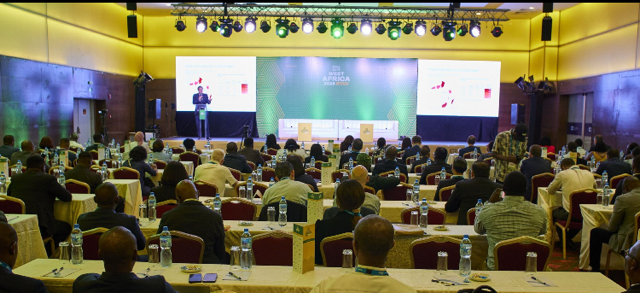At the GTR West Africa 2025 Summit, the mood across panels and discussions was cautious optimism. As Nigeria and Ghana navigate their post-reform recoveries, a confluence of financial innovation, agricultural reform, and strategic energy investment is reshaping the region’s future.
Investor Confidence Rises Amidst Recovery
Economic stabilisation is emerging as Nigeria’s forex reserves strengthen, oil production rebounds, and the naira shows tentative signs of stability. Fresh from a peaceful 2024 election, Ghana is gradually rebuilding after its 2022 sovereign debt default.
Key panelists, including Andreas Voss (Deutsche Bank), Oluwole Ajiboye (Guinness Nigeria) and Aina Dele-Adegbola (FBN Bank), highlighted that while challenges like currency volatility and limited trade finance access remain, investor sentiment is improving and 2025 may herald the rise of “local corporate giants” capable of driving regional growth.
Structural reforms must deepen further, trade finance access needs to democratise beyond top-tier banks, and cross-border trade facilitation should be accelerated to build resilient regional markets.
Digital Innovation: The key to revitalising trade finance
The exit of global banks from African trade finance underscores the urgent need for new solutions. Digital transformation is no longer optional. It is foundational.
Panelists including Simon Umegbu (Standard Chartered Bank) and Ojinika Shote (Stanbic IBTC Bank) explored how technology can cut costs, expand access and reshape financing ecosystems.
From using real-time supply chain data as collateral to connecting banks, logistics firms, and traders through API-enabled platforms, digital innovation can lower barriers for SMEs across Africa.
Experts recommend that banks, fintechs and governments embrace digital ecosystems prioritising efficiency, interoperability and inclusion. Scaling up digital solutions will be crucial for achieving AfCFTA ambitions.
Energy Transition: A dual strategy for oil, gas, and renewables
With global climate finance commitments under strain, West Africa faces a dual imperative: maintain oil and gas resilience while scaling renewable energy solutions.
Experts like Fola Fagbule (Africa Finance Corporation) and Peju Faloye (Oando Plc) outlined the opportunities: from LNG export growth to scaling off-grid solar systems for rural communities.
Infrastructure sabotage and the need for strategic capital deployment in energy storage and grid interconnectivity remain pressing issues.
Development finance institutions, commercial banks and policymakers must collaborate to unlock blended finance solutions and de-risk investments in traditional and renewable energy infrastructure.
Fintech Frontiers: Powering trade growth from the ground up
Africa’s trade growth won’t mirror Silicon Valley; it will be uniquely African. In a fireside chat, Yele W. Oyekola (Duplo) and Tedd George (Kleos Advisory) emphasised that successful fintech innovation must be hyper-local, addressing day-to-day trade frictions such as cross-border payments, stablecoin settlements and automated invoicing.
As the AfCFTA accelerates, fintechs focused on building trust and solving local pain points, especially for SMEs, will lead the next wave of trade growth.
Investors and policymakers must support fintech models prioritising informal market realities, local languages, and SME-centric services to bridge the trade financing gap.
Cocoa Market at Risk: Urgent Need to Support Farmers
Climate shocks, illegal mining and systemic neglect threaten West Africa’s cocoa industry.
Tedd George warned that supply chains will face deeper crises without deeper partnerships between chocolate manufacturers, traders, and farmers, including better financing, climate-resilient inputs, and protection against illegal mining.
Risk-sharing and crop insurance innovation will be critical to shielding farmers and ensuring a sustainable supply.
The cocoa industry must move from reactive to proactive, building long-term loyalty with farmers, investing in land protection and adopting new financing models to secure future yields.
Food Security and FX Shortages: A wake-up call for West Africa
Persistent food importation is draining scarce foreign exchange across West Africa, intensifying economic vulnerabilities.
Industry leaders like Ikenna Egbukole (MITSUN GROUP) and Adewale Adekoya (Stanbic IBTC Bank) agreed that boosting local agriculture is non-negotiable.
Solutions include investing in post-harvest infrastructure, expanding tech-enabled credit and insurance for farmers, improving rural logistics and fostering private-public partnerships.
West African governments, financiers, and private sector players must urgently prioritise agricultural modernisation, growing smarter, faster and together to avert future crises.
Unlocking Regional Integration: Scaling trade finance for SMEs
Despite abundant potential, West Africa’s regional integration efforts under AfCFTA are hampered by inadequate access to affordable trade finance.
SMEs, the backbone of the region’s economies, remain underserved by traditional banks.
But new digital models, fintech-driven supply chain finance and concessional financing from development banks offer a path forward.
Financial institutions, policymakers and development agencies must work hand-in-hand to democratize trade finance, ensuring it reaches the mid-sized and emerging businesses that will drive future intra-African trade.
READ ALSO: West Africa charts new trade, infrastructure frontiers amid global shifts
A defining decade for West Africa
West Africa stands at a transformational juncture from energy resilience and digital finance to food security and regional trade.
To capitalise on this moment, stakeholders must commit to deeper reforms, smarter investments and inclusive innovations that empower businesses and communities across the region.
Experts who spoke at the GTR West Africa 2025 Summit believe the opportunity is real and the time to act is now.
Support PREMIUM TIMES’ journalism of integrity and credibility
At Premium Times, we firmly believe in the importance of high-quality journalism. Recognizing that not everyone can afford costly news subscriptions, we are dedicated to delivering meticulously researched, fact-checked news that remains freely accessible to all.
Whether you turn to Premium Times for daily updates, in-depth investigations into pressing national issues, or entertaining trending stories, we value your readership.
It’s essential to acknowledge that news production incurs expenses, and we take pride in never placing our stories behind a prohibitive paywall.
Would you consider supporting us with a modest contribution on a monthly basis to help maintain our commitment to free, accessible news?
TEXT AD: Call Willie – +2348098788999





